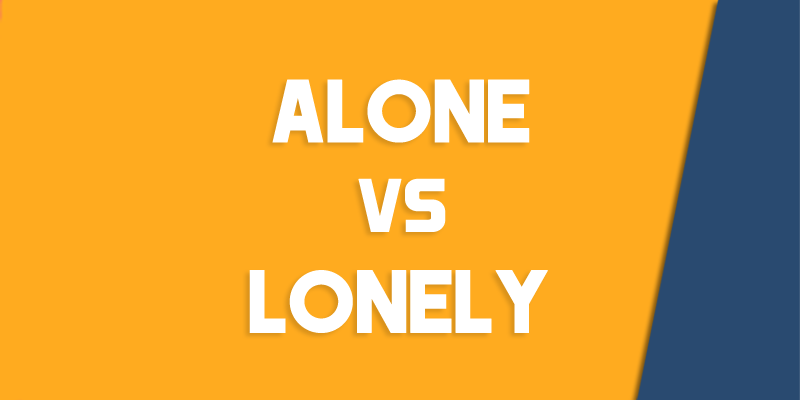Lonely vs. Alone – What’s the Gist?
These two modifiers have very similar definitions, and it’s likely that this similarity leads to some confusion.
- Lonely is an adjective.
- Alone functions as both an adjective and an adverb.
As with most synonymic words, seeking precision in communication will determine the better word choice.

How to Use Lonely in a Sentence
Lonely definition: As an adjective, lonely means being without company or to be cut off from others. It also has the denotation of sadness from experiencing isolation or having a feeling of desolation.
For example:
- With her husband away on a business trip, the woman felt lonely. (Adjective)
- The mountain cabin was in a lonely location. (Adjective)
- Sitting in the large cafeteria at the new school, the transfer student experienced an overwhelmingly lonely moment. (Adjective)
By the way, you may have the idea that because lonely has an –ly ending that it is an adverb instead of an adjective. That’s not always the case.
While it is true that many modifiers ending in –ly are typically adverbs, they aren’t always. Lonely is one of these exceptions. As a descriptive adjective, lonely answers the question which one of the noun that it modifies.
In the above examples, you would ask: Which woman? The lonely woman. Which location? The lonely location. Which moment? The lonely moment.
How to Use Alone in a Sentence
Alone definition: As an adjective, alone means separated from others; exclusive of anyone/anything; or considered without any mention to others.
For example:
- After the store closed, the manager found herself alone. (Adjective)
- The executive officers alone knew about the possibility of a merger. (Adjective)
- The mother realized too late that the boys alone would be able to eat all the pizza she had ordered. (Adjective)
The word alone also functions as an adverb, meaning solely or exclusively; or without aid or help.
For example:
- After surveying the damage to the vehicles, the woman believed that the blame was hers alone. (Adverb)
- The toddler asserted that he could feed himself alone. (Adverb)
As you can see by its definitions and usage, the word alone is definitely related to the word lonely. Alone, however, lacks the sadness as a result of isolation that the word lonely commonly implies.
By the way, the confusion between this word pairing may actually come between the words lone and alone. Functioning as another synonym for the word pairing, lone means having no company or preferring solitude.
For example:
- There was a lone squirrel hopping in the yard.
On the other hand, you might be thinking it’s okay to write it the following:
- There was alone squirrel hopping in the yard.
However, this is wrong. What may help to correct this perception is to know that the sentence placement matters with these two adjectives lone and alone.
As a general rule, when using the word lone, place it in front of the substantive. On the other hand, when using the word alone, put the modifier after the noun.
For example:
- There was a lone squirrel hopping in the yard.
- Squirrels are alone in their ability to figure out birdfeeder deterrents.
Outside Examples of Lonely vs. Alone
- “New York is a lonely, lonely, lonely city,” Yossy Morales said one recent Saturday, a morning so frigid that a bicycle deliveryman outside Burger Heaven on Lexington Avenue at 62nd Street was forced to pour scalding water over his Kryptonite lock to key it open. –Chicago Tribune
- Chloe Jakiela felt lonely after she moved to Salt Lake City from Pittsburgh. It was 2018, and she was adjusting to a new city and had just broken up with her boyfriend. –The Washington Post
- Dallas-based Southwest said last week in a financial filing that it was expecting a $200 million to $300 million drop in revenue in the first quarter alone that ends March 31. Kelly also told CNBC that worries over the illness were having a “9-11-like” impact on the airline industry. –The Dallas Morning News
- Nearly 50 years after Congress passed Title IX to give female athletes an equitable playing field, they’re still looking for a fair shot. In hockey, the U.S. and Canadian women’s teams are good as gold in the Olympics but would love to have a solid league of their own. And they are far from alone. In this special project from The Times, we profile female athletes who are champions of sports and justice, from the trailblazing Billie Jean King, who never takes no for an answer, to Michelle Kwan, who makes time for figure skating and U.S. diplomacy. –Los Angeles Times
Phrases That Use Lonely and Alone
There are several phrases that use either the word lonely or alone, including:
In a lonely place: A remote location (figuratively or literally) away from most people.
- Taking a wrong turn, the family found itself in a lonely place.
It’s lonely at the top: An effective leader or a successful person often finds the experience to be an isolating one.
- Despite the singer’s successful tour, he felt lonely at the top.
Leave me alone: A directive indicating the person giving it needs space or distance.
- The woman heard one of her children say to the other one, “Leave me alone.”
Home alone: Someone is staying at home by himself or herself.
- The young mother enjoyed the rare treat of being home alone by reading a book.
How to Remember These Words
Because these words are both adjectives, you need to decide what you are trying to communicate in order to pick the correct word. Admittedly, due to their similar denotations, this choice may be difficult.
Try to remember this mnemonic device to help.
- To be alone is to be all by yourself.
Alone and all by yourself both start with al.
- To be lonely is to be lonesome.
Lonely carries with it the idea of sadness due to one’s isolation. Alone doesn’t have this implication, and that is the key difference between the two words.
Article Summary
Is lonely or alone correct? The word lonely is a modifier that reflects being without company and being sad about that fact. The term alone is also modifier that means to be separated from people, the connotation being a more voluntary action than its counterpart.
Being lonely doesn’t necessarily mean that you are alone. Interestingly, the converse is also true. Being alone doesn’t necessarily mean that you are lonely.
- Lonely is an adjective.
- Alone functions as both an adjective and an adverb.
